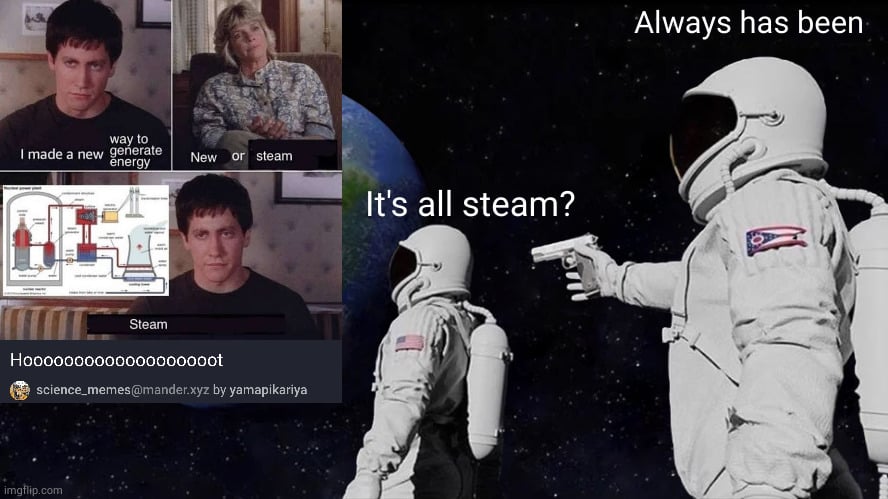Water and steam just too goddamn convenient. Super high latent heat so it can move a ton of energy with a quick phase change, works at reasonable pressures and temperatures, stays liquid all the time when you want it to so pumps work, and it’s so readily available as to be damn near free. Super cool!
also almost non-corrosive, non-toxic, doesn’t damage ozone layer, zero global warming potential, non-flammable etc (lots of organic rankine cycle fluids fail one or more of these. tradeoff is utilization of lower temperature sources)
zero global warming potential
This one isn’t right. Nobody will complain about you releasing it, but it’s a quite strong global warming gas.
Very strong GWP, but it does this cool thing where it condenses when it hits colder air and falls back to the ground in liquid state, thus removing itself from the atmosphere…
(It’s equivalent GWP is near zero and is estimated to be between 0.0005 and -0.001)
it condenses when it hits colder air and falls back to the ground in liquid state, thus removing itself from the atmosphere
Oh sure … blame it on the rain.
Tell me more about this incredible process. Does it have a name?
If it doesn’t I propose a simple and descriptive “waterfall”.
I prefer the more poetic “God pissing on the monkeys”
What would the white stuff that comes from the sky then be called?
Power station fall-out
precipitation
But it can be contained and condensed for reused.
deleted by creator
It’s great for nuclear reactors. Hot rock make turbine go brrr
Best explanation of nuclear energy I’ve ever heard
Nuclear energy is solar too
In the same way that hydrogen, given sufficient time, turns into people
nah not solar, the energy comes not from Sol the star, but from dead stars of past.
Him: Our sun is a nuclear reactor too.
You: Our nuclear reactors are made of dead suns.
Both right, yet disagreeing.
Solar photovoltaic is the only one i can think of that isn’t just a fancy way to make steam
EDIT
ok let’s clarify to say a method that isn’t related to movement of a fluid that spins a turbine. So not windmills (air is a fluid), not hydro, not geothermal, etc.
Piezoelectricity is the only other I can really think of. But it’s not like we are out here smacking crystals with hammers to make power.
Why not, though?
On a serious note: that’s exactly what we’re doing with lighters. At least some of them use piezo elements and not the sparkly wheel thingy to ignite the gas. And it’s real fun to zap yourself with it.
Yeah, it was a fun journey of learning to look into it. It’s quartz btw. Very piezoelectric and extremely common.
The conversion rate isn’t great.
There were talks of using them in sidewalks, but it doesn’t really make much sense really. Piezo almost always only works as energy recovery, which isn’t nothing but you will need the infrastructure which also isn’t nothing.
Give buskers the acoustic guitar with a link to the grid and every time they play they’ll generate a ton of electricity (in relative terms…)
Electro-Acoustic guitars use piezos to pick up the audio if you didn’t know
Wait a minute, what IF
Even if we used piezo, the movement of the hammer would still have to come from some power source, which would still be the same sources like moving steam, water, or wind.
piezoelectricity is just simple electric motor
?
piezo crystal is electric motor. you input deformation of the crystal and get potential difference on opposite sides. other way around also works
Oh! Gotcha! Makes sense. Forgot about crystal vibrations for clockworks. Thanks!
it’s a special case there, because for frequencies in question mechanical quartz resonator has much higher Q than any electrical resonator you can practically build. that is, mechanical properties of piezo crystal stabilize voltage oscillations
All power generation is either solar or ‘make thing spin’, unless we’re including RTGs and Piezoelectrics.
But not all electricity generation is based on boiling water. Wind, hydro and tidal don’t need to generate large amounts of heat to make steam that spins a turbine, they just use natural movement to do so.
Yes, make thing spin
Peltier Effect?
That’s the principle used by RTGs right?
All of these are in some way heat engines
Yeah but those heat engines don’t rely on spinning things inside a magnetic field. Heat on one side, less heat on the other side, and you have current. No motors.
even photovoltaics are heat engines in broad definition
We’re all heat engines on this blessed day if you broaden the definition enough.
Solar thermal power…
Yes? Makes things spin.
What about Wind Mills?
Wind is just dry steam
Seriously though
Also hydroelectric
That’s just condensed steam.
By that logic, solar is just a huge pile of steam undergoing fusion.
Plasma is spicy steam
You know that’s a stretch 😉 but I’ll give it to you. But we are not MAKING wind/steam there.
Hydro power uses running water not hot water.
Squeezing can be converter to electricity with pizeo electric. Heat difference can be converted into electric directly with peltier devices. Both of these are very inefficient ways to make electricy.
I’m the spirit of this comment, water is just cold steam.
How do you feel about water ice being a mineral?
there are also fuel cells
I guess aeolic energy also doesn’t use steam (unless we count the air humidity), but still involves turning a turbine.
Excuse my blatant ignorance, but what is aeolic energy? I’ve never heard about it before.
Garlic power.
Nah, just a non-traditional way of saying wind generators like turbines.
Apparently it’s the fancy word for wind power.
or just french
French words are the fancy words in English. French was the language of the upper classes for a long time.
What a dissapointment.
The peltier effect can be used to generate electricity from a thermal gradient. It’s not very efficient, though. There’s a reason mechanical means of electrical production predominate.
Aerokinetics/hydrokinetics as well. With steam, we’re creating the source fluid that turns the turbines to make electricity. Those source fluids can also exist as wind/tides/rivers naturally.
That’s why Photovoltaic Cells got the Nobel Prize, imo. The only new way to generate electricity actually put to use AFAIK.
Of course it’s completely inefficient at large scale and they just revert back to mirroring light into a collection tower where steam happens.
Wasn’t the main appeal of the mirror installations that you can store the heat somewhat efficiently? Rooftop solar is cost effective even here in Germany, where darkness and shadows loom around every corner.
The nonchalant poetry of your reply made me look up and appreciate your username.
These numbers change every year, but: solar panels on roofs don’t track so they’d be lucky to get 20%, average closer to 12%, efficiency and slowly degrade over a few years. Sun tracking panels can reach a maximum of around 40%, theoretically, but on average more like 20%-30%. You have to subtract the negative impact of creating and assembling the materials from it’s lifetime effectiveness, in Germany I believe Hydrogen Steel exists which is much greener than other types of smelting, or otherwise Aluminum is the higher grade material used for such things, and Photovoltaic Panels have a very specialized Glass in most cases that has to be exceptionally clear and strong. If the capacitance of the system is not enough to hold the produced power then an electrical failure will occur, so you must also include large commercial and industrial batteries.
Meanwhile, a Heliostat (a Collection Tower and Mirror Array) out in the desert has a theoretical efficiency just below 70%. Furthermore, if the capacity of the grid fills up then the array can be disable by adjusting the mirrors and excess power can be stored for extremely long periods of time by utilizing molten salt beneath the tower.
These efficiency numbers refer to how much of the heat energy from full spectrum light hitting the array is converted into electricity. Home panels are nice because you can put them on your home
Yeah, but PV is dirt cheap nowadays. Also
degrade over a few years.
If by “few” you mean like 30-50 then sure, they degrade. But it certainly beats anything with a spinning turbine. Or anything with moving parts really. PV is purely solid state physics, you can’t get more longevity than that.
If the capacitance of the system is not enough to hold the produced power then an electrical failure will occur, so you must also include large commercial and industrial batteries
That’s not true. You can also simply turn PV off. The inverters only run when they sense 50 Hz on their output terminals, it’s easy to have them turn off when it’s 50.2 instead. Basically all big powerplants follow that rule already, ordered by things like shutoff time etc.
a Heliostat (a Collection Tower and Mirror Array) out in the desert
Funny that you specified in the desert. The appeal of PV is not only that it’s cheap and easy, it also scales down to small investments and local power generation. If base load actually becomes a problem concentrated solar power will be relevant. But for now, slapping a few solar panels on your roof just makes sense.
lmao your consumer grade photovoltaic panels will not last 50 years.
The solar panels I just bought have a manufacturer warranty for 87% power output after 30 years.
That’s much more realistic, I like that.
My dad is still using the first 60w panel he bought in 1986, for 600$. Obvs added many more to his system, and who knows how efficient it is, but it does work, haven’t put a ampmeter on it though.
Mind you it was made in the USA, probably better materials than nowadays.
The mass market has really pushed solar panel production. I expect the material quality even of the cheap china panels to be better than what anyone was able to produce almost 40 years ago. That’s a long time to understand degradation processes and develop countermeasures.
it’s both, but i’m not sure if these large solar concentrators (ivanpah or these things in spain) are more efficient than current pv panels
I mean, if they’re dramatically cheaper, they don’t have to be efficient.
That being said, solar cells get around 20% efficiency, steam generators maybe 50% on a good day, subtract the reflection, collection and storage inefficiencies and you might get roughly in the same ballpark as solar cells.
Non-tracking solar panels are closer to 12% actual efficiency, 20% would be a theoretical efficiency. I only mention this because you used an actual efficiency estimate for the steam generator but not the solar panel.
That’s because I’m so smart I completely ignored that the sun moves around during the day.
There’s also wind. But that just skips the steam
There is an argument to be made that the wind power is technically steam power, given the moist gaseous fluid turning a turbine, but that’s silly.
Right. We all know it’s generated by trees. It’s why cutting trees down is so bad for the environment, it stops the wind and everything gets more hot. Leading to global warming.
I am now picturing a line of trees rocking back and forth to generate air and wind for us.
Buy it’s all better than the old smoky steam we used to use
Cost per MWh is what tends to matter more than efficiency. Photovoltaics have become dirt cheap. Mirror collection systems haven’t been able to keep up, and the projects for them are basically defunct at this point.
Was worth trying, though. It wasn’t obvious that photovoltaics would get so damn cheap 10 or 20 years ago.
deleted by creator
great for satellites tho
Is it that they’re inefficient or harder to maintain?
Yes. Heliostat’s max efficiency estimates are like 70%, sun tracking panels 40%, static panels 20%.
20% for static panels is fine though because they are spamable. They are cheap and you can just put them on roofs and parking lots.
Nobody was arguing anything otherwise, I was just answering questions about why we swap back to steam power for largescale. If you’re powering some LEDs and a Toaster then yeah it’s fine, if you’re powering 10,000 then heliostat time.
“I found a new source of naturally occurring waste heat”

Yep. Angry rock make water go hiss.
Some types of fusion can bypass steam generation and use what’s creatively called Direct Energy Conversion. If the fusion products are charged particles they can be passed through a magnetic field to separate them based on charge and collected onto plates. When you look at the electric potential between the plates you’ve effectively created a voltage, no steam necessary. It’s also theoretically possible to do the same with some types of fission products too.
I thought they take advantage of the velocity of the charged ions to magnetically transfer power to electromagnetic coils around the reactor.
There’s a whole bunch of mechanisms, largely depending on the fusion architecture and the atoms being fused. For tokamak reactors the circular nature lends itself well to what you describe, though usually it’s energy being imparted into the ions to keep them contained and away from the walls. In the ‘standard’ deuterium-tritium fusion model (the easiest to perform) fusion produces a helium nucleus and a neutron, where the neutron gets most of the energy. Since a neutron can’t be contained by magnets it impacts the chamber walls. This heat is wicked away by, you guessed it, cooling water which turns into steam. In order to use a direct energy conversion strategy you need a fusion reaction that produces no neutrons, but we’re not there yet.
generate energy.
not generate electricity.
generate electricity.
not generate electricity.
generate electricity the other way around.
not generate electricity.
generate electricity.
not generate electricity.
generate electricity the other way around.
not generate electricity…
Edit: I dumbly misread your post (energy/electricity) & thought of this, which I will leave here because it made me smile & that’s a good thing.
/uj Steam is just an intermediary form for almost all these tho (except maybe geothermal? not sure), not the real source.
Steam just makes sense as a fluid for heat engines, thermal power plants are mostly steam, except when gas turbines are involved, but even then there’s most of the time steam bottoming cycle. (gas turbine burns something, then exhaust is hot enough to power steam cycle) Unless thermal power plant is small, then it’s more likely to be diesel engine (up to few MW). Only when it’s photovoltaics, or hydropower, or wind farm (or tidal powerplant, or some other weird ones) there’s no place for steam to be involved (solar thermal plants sometimes use steam cycle). Geothermal powerplants use steam if source is hot enough, otherwise it’s something more volatile in organic Rankine cycle
Hydroelectric is just liquid steam, and wind is just cold, thin steam.
I’m referring to the root energy source, rather than how it’s transferred.
Then it’s just heat transfer medium for most of geothermal powerplants too, because from what i understand, most of the time condensed water is recycled (and source of energy is just “hot rocks” anyway)
then if you look at the bigger picture, all that energy can be traced back to either sun, nuclear fission (in reactors) or nuclear decay/primordial heat (geothermal)
“Root” energy source really just depends on where you draw boundaries of thermodynamic system in question
Geothermal power still uses steam to generate electricity. It’s steams all the way down.
Steam isn’t the energy source tho, just a transfer mechanism.
Same for all the others like coal and nuclear though. So that’s a dumb distinction to try to make.
Steam is always just a transfer mechanism if it’s part of the power generation
Then why focus on steam specifically, why not other required intermediaries, like turbines, the storage mechanism.
The main meaningful distinction in energy generation is the root sources of the energy, nuclear, wind, hydro, etc. All of those share similar conversion methods and intermediary forms, but have different sources.
Because it’s a funny fucking meme my dude.
Hence the meme. Because almost everything uses steam.
Any other jokes you want to break down for no reason?
deleted by creator
Solar is an exception I think
True, but there are also solar steam systems, using a parabolic mirror to focus the sun on a steam drum.
Arguably these are even greener than photovoltaics, since they don’t require the same kinds of materials to make (mostly just steel) and last longer than photovoltaics are supposed to. They use a fair bit of water, but you probably aren’t building them in places where water is at a premium.
I mean the main steam cycle solar plants are built in dry sunny hot regions, not exactly a great source of water, but probably not completely void of it either.
Solar, wind, and hydro don’t use steam. (Well, hydro can bypass the steam part. It depends)
Hydroelectric is just liquid steam, and wind is just cold, thin steam.
and diodes
It always produces unbelievably great memes when another person discovers how humanity generates energy from splitting atoms. I was baffled, too.
It just makes sense. Our only way to convert electromagnetic radiation to current is photovoltaics, so solar. No way to convert alpha/beta radiation to current. So what else does fission release? Fuckload of motion. Mostly heat if it’s not as a blast, in which case it’s still mostly heat but with a pressure wave that levels cities. Heat though, heat were real good at making into electricity.
I like piezoelectrics and kinetic generators. The only two methods of generating electricity I know of that don’t involve steam other than solar panels.
At least, I think they’re different… Is a standard copper wire+magnet generator pizeoelectric? Or is it simply the operation is similar in that you generate electricity from moving things together? Like the difference between tiny little things in your shirt that generate electricity as you move around vs those flash lights you shake to charge.
Piezoelectric effect is when you vibrate certain crystals and they give off electricity. It’s also reversible. You can feed them electricity to generate sound. The beep-boop sound from small electronic devices is usually from a piezo speaker, because they’re dirt cheap.
You don’t get significant amounts of power out of it, though.
Yeah it’s quartz lol
Also photovoltaic is reversible as well! Put light in get current out, put current in, get light out. But the diodes that get good light for the currents we use are shit for generating the current we like from the light we have and vice versa. Also! Most diodes are these types! That’s why we make their casing black, otherwise the light will interfere with computation!
Yeah. The one thing I ever saw that has me excited for a product that could exist, is that they can power a simple OLED display. And since an OLED display can be paper thin, they could put one in a t-shirt and you could have an animated design on your shirt instead of just a static picture. And that would be dope.
Of course, you’d need more than just the display, and i don’t think the little generators that can be sewn into a shirt would be enough to power the computing device that would be necessary to drive the animation for the display.
and then you also have to find ways to wash this shirt without ruining the electronics of it
Dry cleaning.
They’re different. The piezoelectric effect converts pressure to charge. However steam is just kinetic with an extra step
If/when aliens ever visit us, it’ll be with glorified steam engines.
is it time for steam cars to make a come back?
Nothing I’d love more than waking up an hour early to stoke my car’s boiler.
Giggity
Donnieeeeeee















